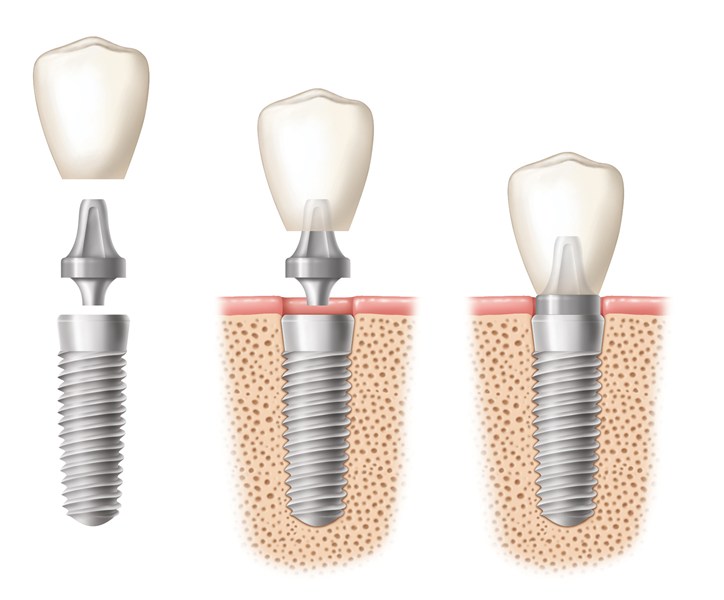Losing a tooth, either due to an injury to the mouth or decay caused by aging or poor hygiene, happens to millions of people each year. Dental implant surgery is a common solution to the problem because it replaces the tooth with the help of a crown or bridge to give the appearance and feel of natural, healthy teeth. The American Academy of Implant Dentistry estimates that the rate of implants increases by 500,000 each year, while the procedure has been used in professional dentistry practices for decades, patients considering dental implant surgery often have questions relating to the fix. Understanding the expectations for dental implant surgery, the process for healthy aftercare, and how to protect against the risks of surgery help ease the hesitation commonly experienced by dental implant patients.
Dental Implant Expectations
Nearly all dental implant surgeries are performed under the trained care of a dental surgeon as an outpatient procedure, albeit over multiple phases. First, a comprehensive exam is completed so that a viable treatment plan can be determined. Every patient has varying needs when it comes to dental implant surgery, and so it is necessary to work through the anticipated outcomes prior to surgery taking place. Once a plan of treatment is recommended by the surgeon or specialist and accepted by the patient, the first step in dental implant surgery is extraction where the damaged or decayed tooth is removed.
In some instances, patients have a weakened jaw bone that requires strengthening before the dental implant procedure can be completed. This is typically done through a process known as bone grafting, where bone is taken from another area of the body and set within the jawbone. The bone graft helps support the dental implant inserted as the replacement. While some patients only require a small bone graft in preparation for the dental implant, others may need several grafts over a period of time to ensure the jawbone is strong enough to move forward.
When the jawbone is set, the implant surgery begins with the cutting of the gum, deep enough to expose the bone. Some drilling is required to create room for the supporting posts on which the implant will rest. Over a period of months, the posts come together naturally with the jawbone to create a strong support, after which time the implant, or the artificial tooth, is placed in the mouth. The implant is either a removable denture or a fixed tooth that cannot be removed, depending on the patient’s needs and preferences. The dental implant process can take several months from start to finish.

Aftercare Recommendations
After each phase of the dental implant process, it is important to patients to follow instructions provided by the surgeon closely. Common recommendations for a safe and quick recovery include refraining from drinking extremely hot or cold beverages, eating certain solid foods, or failing to keep up with any prescribed antibiotics or pain medications as needed. Applying a cold compress to the cheeks or the jaw for up to a week after surgery helps reduce swelling and discomfort for most patients.
Although pain medication is sometimes provided after a dental implant surgery, patients are instructed to use over-the-counter pain relievers or anti-inflammatory medications as a first step. Bleeding may occur post procedure, but it can be subdued by using sterile gauze every few hours. Keeping a clean mouth is a crucial aspect of steering clear of infections and painful side effects of surgery, and this is done through a combination of prescribed antibiotics and warm water rinses, as instructed by the surgeon.
Protecting Against Surgery Risks
Even though dental implant surgery is fairly common when damaged or decayed teeth need to be replaced, there are risks associated with the procedure. The most common issues that could arise after a dental implant or extraction include damage to the surrounding teeth, nerves, or blood vessels, infection in the mouth, nerve damage pain, and sinus infections. A representative from a medical solicitor firm in the UK that handles cases involved dental implants shares an added risk that is all too common: incorrect extractions. Although claims for wrong tooth extractions are relatively rare, having an incorrect tooth removed can cause undue pain while also extending the dental implant process by several months. To avoid these risks, it is important to have an understanding of the process, and feel comfortable communicating with a dental surgeon or another specialist before the procedure taking place.
Replacing lost or damaged teeth can give patients back the full function of their mouth as well as a much-needed improvement in the self-esteem department. However, to reap the most reward from the dental implant process, it is necessary to be aware of the time it takes to complete the full procedure, the steps required for adequate aftercare, and the risks associated with having the surgery.

